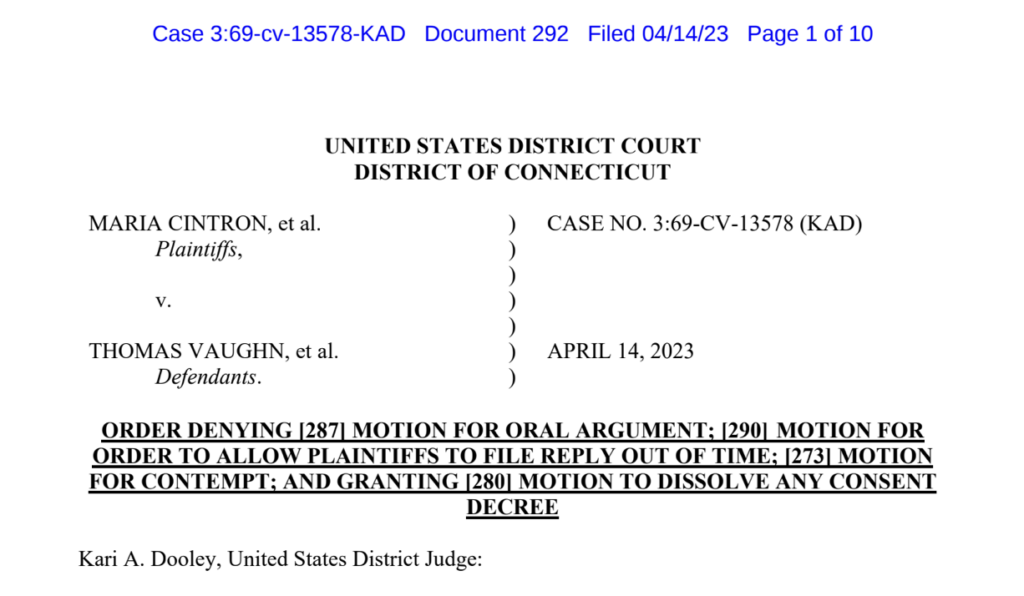On April 14, Judge Kari Dooley dissolves the consent decree. She finds no compelling points of contempt in plaintiffs’ recent motion, which was presented without supporting evidence: “Plaintiffs’ motion is both procedurally flawed and substantively meritless.”150 Dooley describes Attorney Schulman’s motion for contempt as a “unilateral attempted end run” around the procedures set out in the 2010 Settlement Agreement.151 She rules that the points of noncompliance alleged by Schulman are minor, and that “‘Perfect compliance is not required’ to avoid a finding of contempt, and [the defendant’s] compliance—though belated—is reasonable enough under the circumstances here not to warrant a finding of contempt.”152 Judge Dooley also rules that the HPD has presented compelling evidence of their effective efforts towards diverse hiring, denying a major contention of Schulman’s motion for contempt.
Plaintiffs submit a motion to reconsider, arguing that the original decree’s intent should be upheld, even though it did not include clear benchmarks for department diversity. “The effect that the dissolution of this Consent Decree has is grave,” Schulman writes.
While the Consent Decree was in effect, police-community relations were hot and cold, but at least the citizens of Hartford could take solace in the fact that the Hartford Police Department has a mandate to at least attempt to be better for their citizenry. Dissolving the Consent Decree strips the citizens of the City of Hartford of that solace, fosters mistrust between the police department and the community, and will lead to manifest injustice. The plaintiffs urge this Court to reconsider its decision.153
Plaintiffs submit a motion to reconsider, arguing that the original decree’s intent should be upheld, even though it did not include clear benchmarks for department diversity. “The effect that the dissolution of this Consent Decree has is grave,” Schulman writes.
The motion includes new evidence, such as affidavits from members of the Cintron Negotiating Committee regarding the persistent problems with police-community relations and diverse police recruitment in Hartford. Corrie Betts, president of the Hartford NAACP, affirms that due to a lack of diversity “There does not currently exist in Hartford the trust necessary between the Hartford Police Department and the community that the provisions of the Consent Decree will be honored and fulfilled”.154 Defendants oppose this motion, pointing to judicial rules which render the new evidence inadmissible.155
In her final order regarding the case, Judge Dooley affirms the consent decree’s termination, finding that the plaintiffs had not presented new evidence that would justify reconsideration. She asserts:
To be clear, the Court recognizes the immense importance of the consent decree at the time it was adopted and its impact on the diversification of the Hartford Police Department over the past five decades. However, for all of the reasons articulated in the Court’s prior order, the Court’s involvement in this case is no longer warranted. In 2010, all parties clearly articulated an intention that the consent decree was approaching the end of its usefulness and should sunset. The Court’s order therefore simply brought across the finish line the dissolution that was contemplated by both the Court and the parties for over fourteen years. The next step in Plaintiffs’ continuing, important, and commendable efforts to promote diversity in the Hartford Police Department lies not with this Court, but with the police department itself, the City of Hartford, and the greater Hartford community.156
Hartford’s city council passes a resolution expressing disappointment with the dissolution and supporting continued oversight. They take up Dooley’s invitation to pursue accountability through non-judicial means, since “residents of the city continue to call for mechanisms to hold the police department accountable.”157 The council resolves that the City institute its own policies that align with the intentions behind the consent decree, specifically the demand for diversity but pertaining to “other provisions” as well. They ask that the HPD publicizes its reform efforts on their website, send city council a plan for policies that restore the goals behind Cintron, and provide bi-annual reports to city council on their progress.158
Currently, the HPD’s “minority report” is featured on their website’s home page, accompanied by the promise that the department is “committed to demonstrate transparency to evaluate our progress toward diversity goals. We strive to attract diverse candidates, build trust, and foster an inclusive environment in law enforcement.”159 The report includes demographic statistics on the HPD’s 2024 classes and describes the numerous activities and community partnerships maintained by their recruitment department, which consists of two full-time sworn officials.160 The website also provides many departmental policies and reports including citizen complaint procedures, recruitment reports for the past four years, a staff organizational chart, and directives such as “Limits of Authority,” “Use of Force,” “Investigatory Stop Policy,” “Bias-Based Policing,” “Chemical Agents,” and “Youth Investigations.” It is difficult to gauge the effect that this procedural transparency has on police-community relations, policing, or public safety. Ultimately, the HPD is not the only body responsible for the ineffectiveness of attempts to reform policing as their behavior cannot be separated from the wider social, political, and intellectual context that in the words of James Baldwin “measures [its] safety in chains and corpses.”161 Capitulating to these superficial, if well-intentioned, reforms does not change the fundamentally predatory nature of policing, which is supposed to uphold racial and class hierarchies. All levels of state power have an interest in maintaining this capacity; when city council or a federal judge chastises the HPD, it is like one hand slapping the other.
Notes
150. Order Denying [287] Motion for Oral Argument; [290] Motion for Order to Allow Plaintiffs to File Reply Out of
Time; [273] Motion for Contempt; and Granting [280] Motion to Dissolve any Consent Decree at 4, Cintron, et al v.
Vaughn, et al, 3:69-cv-13578-KAD (D. Conn. April 14, 2023).
151. Ibid., 5.
152. Ibid., 7.
153. Motion to Reconsider Order Denying the Plaintiffs’ Motion for Contempt and Dissolving any Consent Decree at
11, Cintron, et al v. Vaughn, et al, 3:69-cv-13578-KAD (D. Conn. April 21, 2023).
154. Motion to Reconsider Order Denying the Plaintiffs’ Motion for Contempt and Dissolving any Consent Decree,
Exhibit E, 28.
155. Defendants’ Objections to Plaintiffs’ Motion to Reconsider Order Denying Motion for Oral Argument and
Presentation of Witnesses [DKT. #293] and Plaintiffs’ Motion to Reconsider Order Denying the Plaintiffs’ Motion
for Contempt and Dissolving any Consent Decree [DKT. #294], Cintron, et al v. Vaughn, et al, 3:69-cv-13578-KAD
(D. Conn. April 27, 2023).
156. Order Denying Motions for Reconsideration at 6, Cintron, et al v. Vaughn, et al, 3:69-cv-13578-KAD (D. Conn.
September 8, 2023).
157. “Resolution” (Resolution of the Court of Common Council, Hartford, 2023), 15. PDF
158. Ibid., 16
159. Home Page, Hartford Police Department, City of Hartford, link
160. “Increasing Minority Representation – Reflecting Community,” Hartford Police Department, 2024, pdf.
161. James Baldwin, “An Open Letter to My Sister, Angela Y. Davis,” in If They Come in the Morning: Voices of
Resistance, Angela Davis (New York: Third Press, 1971). 1-19.

